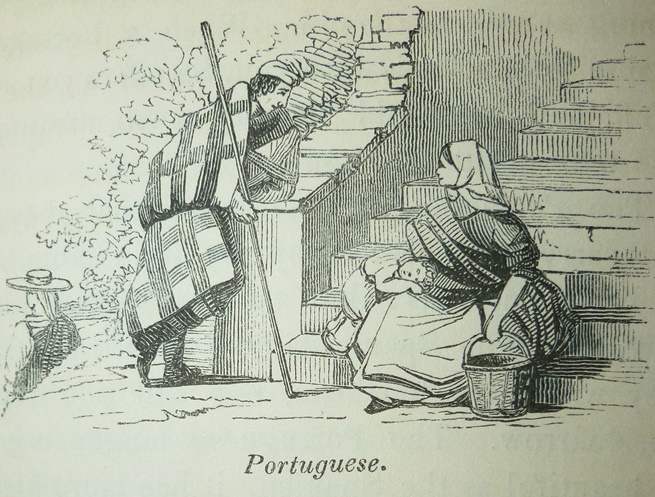
April 20, 2015, by Kathryn Steenson
“Macaroni looks like serpents”: A Victorian arm-chair traveller’s guide to Europe
“Superficial, incomplete, trifling! Such is the true character of this book. Inaccurate we hope it is not…the world, old as she is, would not sit still for her picture.”
So begins the 1849 book ‘Near Home, or The Countries of Europe Described’ by Favell Lee Mortimer, nee Bevan (1802-1878). Now almost forgotten, Mortimer wrote 16 educational books for children that sold hundreds of thousands of copies in the 19th century. ‘Near Home’ is the first in her series of geographical primers. It specifically focuses on Europe, with the other books covering the other continents.
It is probable that the opening sentences refer to the revolutions sweeping across Europe in 1848. Even so, political turmoil isn’t enough to explain the inaccuracies and xenophobic stereotypes on every page.
Born in London to a wealthy family, she spent considerable periods of her adult life in Shropshire and Norfolk. As a teenager, Mortimer accompanied her family to Paris and Brussels, which was the extent of her foreign travel. Bizarrely, in her book she barely bothers to discuss one of the few countries she has actually visited, as Belgium ‘is so like the countries on either side’. Perhaps it did not leave much of an impression on her. Whilst Turkey and Russia were perhaps understandably too far away to visit, the same can hardly be said for Wales. Despite living in Shropshire – a county that borders Wales – she never visited, but still confidently declared that Wales was a beautiful country where women ‘knit as they walk along to market’.
Apparently the English are very blunt, a sentiment Mortimer embraced wholeheartedly, as the excerpts below prove:
Italy: The favourite food of poor people is macaroni. It is made of flour and water. Macaroni looks like white serpents. The people are ignorant and wicked. Their religion is Roman Catholic. Their chief amusement is gambling. There is light for the eye in a Sicilian church, but darkness for the soul.
Poland: You may go a great way without seeing anything pretty. Poland is a plain of sand. Yet the Poles are pleasing in their looks. More Jews live in Poland than in any other country. The Jews are not idle like the Poles, but try in every way to get money.
Scotland: The Scotch are very wise and sensible. One of the chief faults of the Scotch is the love of whiskey. Another fault is the love of money.
Iceland: There is fire underground that makes the water hot. There are many hollow places in the ground, like basins, full of hot water. Sometimes the Icelanders do bathe in the warm basins-not as often as they should, for they are a dirty people. They are dull and slow, but they are honest and true.
Spain: You would think many of the Spanish dishes were spoiled by the [olive] oil and the garlic with which they are mixed. [The Spanish] are cruel and sullen, and revengeful. It is true their language is the finest in Europe, but there are very few wise books written in it.
Portugal: No people in Europe are as clumsy and awkward with their hands as the Portuguese. Portugal, like Spain, is filled with robbers; the laws are not obeyed, and the wicked often escape without being punished.
Mortimer’s writings were not outlandish in the wider context of British Imperialism of the time. The British believed they were ‘civilizing’ backwards populations by converting and colonizing them, and even comparatively minor differences between European nations were generally considered weaknesses. Such sentiments were not only acceptable to publish, but were enthusiastically received: our copy of ‘Near Home’ has inscribed on the first leaf “Miss A. Stoddard, for an increased degree of attention during the last term”, dated December 1848 [sic] and signed by either a teacher or governess.
Many of Mortimer’s books were about religious instruction, but her Evangelical motivations are apparent even in her geography primers: good countries have a majority Protestant population that read their Bibles and observe the Sabbath. In the preface she stated she wished to encourage children‘s learning that they might be all the more eager to read the Bible, and expressed an absolute horror that “it is not rational treatises, nor true histories that are most in demand by adults-but-but-Novels!”.
Even as an academic instruction, we strongly disagree that “it would be better to read nothing”!
Although not read by children today, her books have provided good research material for the history of education and women’s history, such as Megan Norcia’s ‘X Marks the Spot : Women Writers Map the Empire for British Children, 1790-1895‘ (institutional log-in may be required), as well as more general humour books and even the occasional podcast.
If you’d like to read what Mortimer thought about your country, ‘Near Home‘ (Briggs Collection LT210.D/M6) is available in our Reading Room. Please see our website for more details.
No comments yet, fill out a comment to be the first

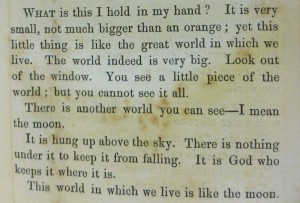
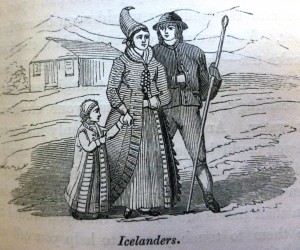
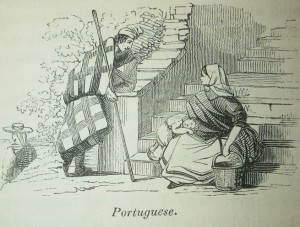
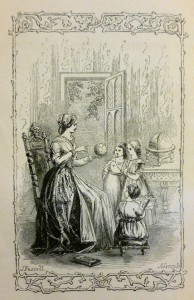
Leave a Reply